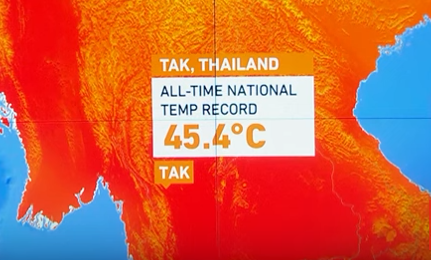BANGKOK – Southeast Asia is currently grappling with an unprecedented extreme heat wave, leaving millions of people sweltering under scorching temperatures. As the mercury soars, the region faces significant challenges, and the consequences for its inhabitants are dire.
The Heatwave’s Impact:
- Heat-Related Deaths: Thailand has already reported 30 fatalities due to heatstroke this year alone. The relentless heat poses a severe health risk, especially for vulnerable populations.
Tak in Thailand has reached 45,4 degrees Celsius, the highest ever recorded in the country.
In the neighboring countries, the same experience: Kalema in Myanmar measured 44 C and Laos 42,7 C. Also here the highest-ever measured temperatures in the country’s history. - Crop Failures: The early heat has scorched wheat crops in India, leading the country to ban exports to nations already grappling with food shortages due to other global crises. Agricultural losses exacerbate food insecurity.
- Energy Crisis: The extreme temperatures have triggered an early spike in electricity demand in India, depleting coal reserves and causing acute power shortages affecting millions. Energy infrastructure strains under the relentless heat.
- Glacier Bursts and Flooding: In Pakistan, a glacier burst resulted in devastating floods downstream. Rising temperatures accelerate glacier melt, threatening water security for millions.
- Wildfires and Droughts: The heatwave has increased the risk of wildfires across the region. Countries like Indonesia, Vietnam, and Malaysia are experiencing exceptionally hot weather, leading to drought conditions and an elevated risk of wildfires.
Long-Term Trends:
- Asia remains the world’s most disaster-affected region due to weather, climate, and water-related hazards. Floods and storms cause the highest number of reported casualties and economic losses.
- Warming Trend: Asia is warming faster than the global average, with the warming trend nearly doubling since the 1961–1990 period. Sea-surface temperatures in the north-west Pacific Ocean reached record highs in 2023.
- Human Impact: Climate change exacerbates extreme events, profoundly affecting societies, economies, and human lives. Vulnerable countries bear the brunt, but early warning systems and preparedness efforts save lives.
Urgent Measures:
- Heat Preparedness: Governments must prioritize public health by implementing heat action plans, providing cooling centers, and raising awareness about heat-related risks.
- Water Management: Addressing water scarcity is crucial. Melting glaciers threaten future water security, necessitating sustainable water management practices.
- Renewable Energy: Investing in renewable energy sources can mitigate the strain on fossil fuels during heatwaves.
- Community Resilience: Communities need support to adapt to extreme heat. Early warning systems, education, and community-based initiatives play a vital role.
In the face of this extreme heat wave, regional cooperation, scientific research, and urgent action are essential to safeguard lives, livelihoods, and the environment. (zia)

